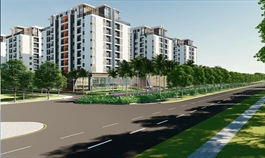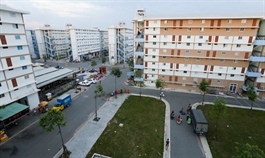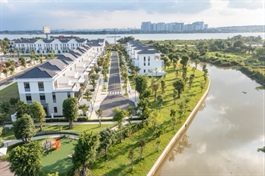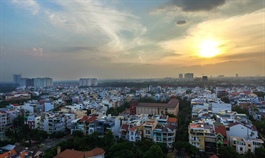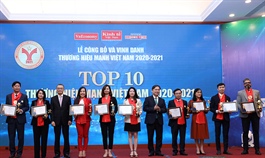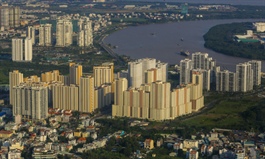Digital transformation to build smart cities in Vietnam
Digital transformation to build smart cities in Vietnam
Along with digital transformation, smart city has become one of the global standards for development and a solution to optimize resources for sustainable growth.
As Vietnam is pushing for digital transformation at a national scale, smart city development is in fact a digitalization process within each city or urban area.
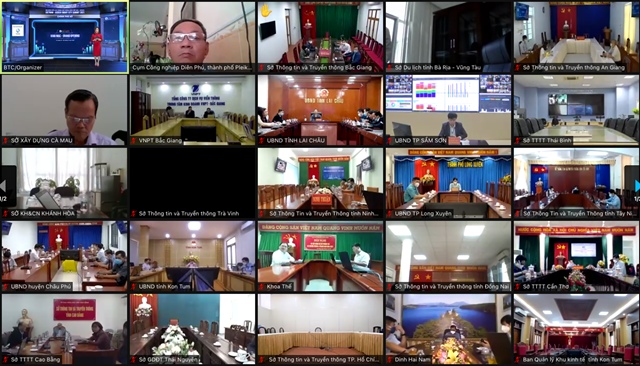
Overview of the summit. Photo: Ngoc Thuy |
“The promotion of smart city should be in close association with the process of digitalization at city/provincial level.”
Vice Minister of Information and Communication Nguyen Huy Dung made the assessment at the Vietnam Smart City Summit 2021 jointly launched today [November 2] by the Vietnam Software & IT Services Association and the Asian-Oceanian Computing Industry Organization (ASOCIO).
According to Dung, the Prime Minister has issued Decision No.950 approving a strategy on sustainable smart city development in Vietnam for the 2018-2025 period, with a vision to 2030.
Meanwhile, Politburo’s Resolution.52 on active participation in Industry 4.0 also sets the goal for the country to have at least three smart cities in key economic zones in the North, South, and Central Vietnam.
“By 2030, Vietnam would have a network of smart cities in these areas and gradually connect with similar networks in Southeast Asia and the world,” he continued.
Dung noted the booming of new technologies from Industry 4.0 and rapid urbanization mean the smart city has now become an inevitable trend and a key driving force for countries around the world in socio-economic development.
“Cities are turning to technologies to address the social issues that emerged during the urbanization process,” Dung said.
He said eventual goals for each city by pursuing the smart city model would be to improve people’s living standards; ensure effective urban management; protect the environment; enhance economic competitiveness; provide convenient public services, and maintain public order.
Dung pointed out a number of cities in Vietnam that have achieved positive results in promoting smart cities, such as Hue or Danang.
“The issue, however, remains a new one not only for Vietnam but also for countries that are ahead in this regard. As such we have to constantly review, discuss and exchange ideas with each other to find the optimal way,” he said.
On this issue, Dung noted in the Covid-19 pandemic, even cities seen as the world’s smartest have been unable to protect people’s lives from the infection.
“The pandemic leaves us with costly lessons on current shortcomings and what we should work on to promote the smart city in the future,” Dung noted.
Smart city to ensure a safe environment to live and grow
Echoing Dung’s view, ASOCIO Chairman David Wong stressed the significance of smart cities given the fact that nearly half of the world’s population are living in cities, and by 2050, every seven in 10 people are expected to live in urban areas.
While only accounting for 2% of the world’s areas, major cities account for 70% of carbon emission and 60-80% of energy consumption, he said.
Wong noted the rapid urbanization is posing huge challenges for the world, such as social inequality, traffic congestion, or environmental pollution.
The question, Wong said, is how cities can improve resilience against future pandemics similar to Covid-19 that has persisted for nearly two years.
Chairman of VINASA Nguyen Van Khoa added the development of the smart city has fast become an urgent need for countries around the world, with the Covid-19 pandemic serving as the main catalyst to accelerate such a process.
“Along with digital transformation, smart city has become one of the main standards for development and a solution for the modern world to optimize resources for sustainable development, in turn providing a safe and convenient environment for the people towards prosperity,” Khoa concluded.
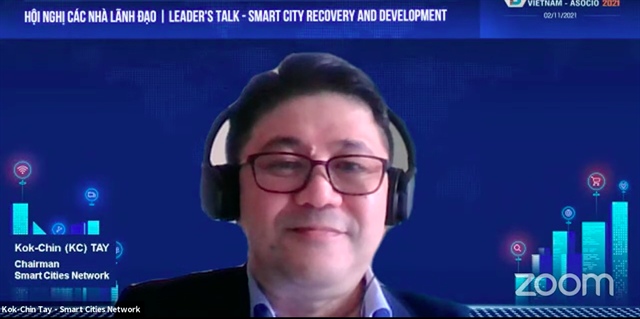
Kok-Chin Tay, chairman of the Smart Cities Network. |
|
Kok-Chin Tay, chairman of the Smart Cities Network, shared with The Hanoi Times his thoughts over the potential of Vietnam in smart city development. From your perspective, what do you think about the potential of the smart city in Vietnam? Of course, there will be tremendous potential for Smart Cities in Vietnam, especially the leading three cities [Hanoi, Ho Chi Minh City, Danang] which are in the ASEAN Smart Cities Network since 2018. However, as shared in several of the presentations today, many cities have a relatively long history of digitalization and they must have learned a lot since then. I am personally aware of Danang is one of the 100 cities in the world involved in the IBM Smarter Cities Challenge back in the 2011-2013 timeframe. You said Vietnam could become a leader for ASEAN in smart city development, what should the country focus on to realize such a goal or issues that must be dealt with? I would advise the Prime Minister to set up a new Ministry - which is the Ministry of Sustainable Smart Cities, reporting to the Prime Minister himself. Then it must be allocated the necessary budget (can move the entire national IT budget to this new Ministry). This was what Singapore did - we called it Smart Nation Digital Government Group - with two groups – Government Tech and Smart Nation Digital Government office - reporting to the prime minister. I think the key issues Vietnam is facing now are the inter-Ministerial hurdles - policies and implementation challenges. What sectors would be the front-runner as cities in Vietnam adopt the smart city models? The first sector must be the Digital Infrastructure - high bandwidth Infra - 5G, fiber, wireless connectivity in all cities and villages. The next would be Education - laying the foundation to develop future leaders for Vietnam. Then, one could do pilot projects for all the other sectors via “Smart Districts” development - Healthcare, Transportation, Environment, Manufacturing, or Tourism. Many have voiced their concern that current smart city models could not protect public health from the Covid-19 pandemic, so how should the model evolve to better address potential pandemics in the future? There were a few examples shared in the use of technologies to cope with the Covid-19 pandemic. Today, the Covid-19 pandemic is a cost incurred by the Government - to minimize the spread and death, and for the healthcare system to cope with. The Singaporean Government spent over SGD100 billion ($74.2 billion) last year to minimize the impact. Various technologies are used to prevent the spread, such as heat sensors, or contact tracings. Once the population is vaccinated - it will be treated like any other illness like a flu. |
|
Smart City Summit is an annual event organized by VINASA since 2017, serving as a platform to share the vision, strategy, and experience of building smart cities of domestic and regional cities, offering solutions for management, planning, and development of suitable smart cities based on new technology platforms such as IoT, Big Data, AI, SMAC... In 2021, Vietnam-ASOCIO Smart City Summit, scheduled to take place from November 2-6, will be held online with 05 thematic contents including Digital Government; Smart real estate; Smart industrial park; Platform, digital solution for the smart city; Startup with the smart city with 14 seminars and the participation of about 10,000 domestic and international delegates from 24 countries and member economies of ASOCIO. |









